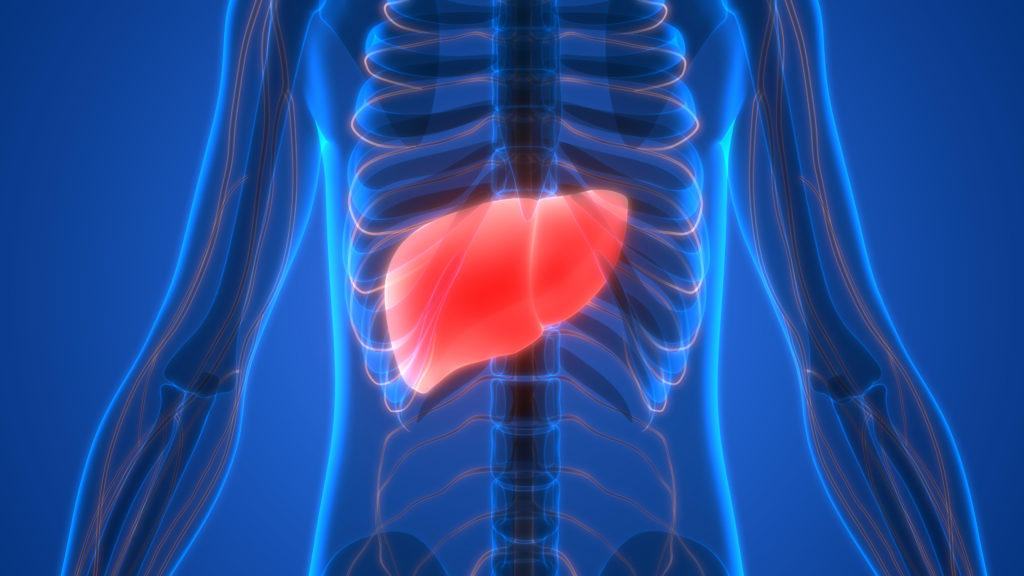By Chris Hyun, MD, gastroenterolgist at The Portland Clinic.

While hepatitis and alcohol-related liver diseases have been declining in the United States, one type of liver disease has been increasing. Known as nonalcoholic fatty liver disease, or NAFLD, this disease is very similar to alcohol-related fatty liver disease, except that alcohol isn’t a factor. The rise in NAFLD appears to be linked directly to rising rates of obesity and Type 2 diabetes.
A study published recently in the journal Gut (Aug. 2019) found that NAFLD may now affect nearly one in three Americans. That study, which looked at nearly 60,000 people, also found that:
- Obesity increased the likelihood of having NAFLD more than tenfold.
- Diabetes raised the odds of having NAFLD almost fourfold.
- Four out of five people with both obesity and Type 2 diabetes had NAFLD.
This type of liver disease rarely has symptoms and is easily overlooked, which is why most people don’t even know they have it until a routine blood test picks up elevated liver enzymes, or a scan ordered for something else happens to spot it in the liver. As a doctor who sees a lot of patients with NAFLD — as well as its more advanced forms — I’d like to raise some awareness, starting here.
What happens when your liver gets fat
NAFLD is strongly (but not only) associated with obesity (body mass index over 30), Type 2 diabetes, and related health issues such as high cholesterol, blood pressure and blood sugar. When you have these problems, they hamper your body’s ability to metabolize fat, leading your liver to store excess fat in its own cells. A liver that reaches or exceeds 5% fat is considered a fatty liver.
Having a fatty liver may not affect your health dramatically today, but it could have a major impact on your health and life down the road. Too much fat can overwhelm the liver and cause inflammation. About 20% of people with NAFLD progress to this more advanced stage of disease, called NASH, or nonalcoholic steatohepatitis (steato means fat, and hepatitis is liver inflammation). NASH leads to cirrhosis in about 25% of people and to liver cancer in 2-3%. Over the next decade, NASH is expected to overtake both alcoholic liver disease and hepatitis C as the leading cause of end-stage liver disease and the most common reason for liver transplantation.
For all of these reasons, it’s vital to identify NAFLD today so you can begin taking measures to prevent severe consequences tomorrow.
Take control of your risks
If you have any of the diseases associated with fatty liver, I recommend visiting your primary care provider to discuss NAFLD and whether an evaluation makes sense. A blood test coupled with imaging, such as ultrasound, is usually enough to diagnose it. Although there is no drug approved specifically to treat NAFLD, there is plenty you can do about it. In fact, the power to prevent it, control it or even reverse it is in your hands.
Making these healthy changes will go a long way toward reducing your risks:
- NAFLD is linked to eating a lot of red meat, butter and other saturated fats. Replace these with fish, lean protein and omega-3-rich oils, such as canola.
- A high intake of industrial fructose (found in sweetened drinks, syrups, baked treats and other packaged products) is also linked to NAFLD. Satisfy your sweet tooth with whole, crunchy, high-fiber fruits instead.
- Speaking of fiber, eat more of it: fill half your plate with vegetables (not counting starchy veggies), and trade white bread and pasta for whole-grain varieties.
- Commit to a regular walk, sport or exercise program on most days of the week.
- Avoid alcohol: it accelerates liver damage and contributes to weight gain.
- Enlist the help of your health care team, including physicians, dietitians and others, if needed. We’re here to help you manage your medical issues and to provide the guidance, tools and support to help you succeed.


